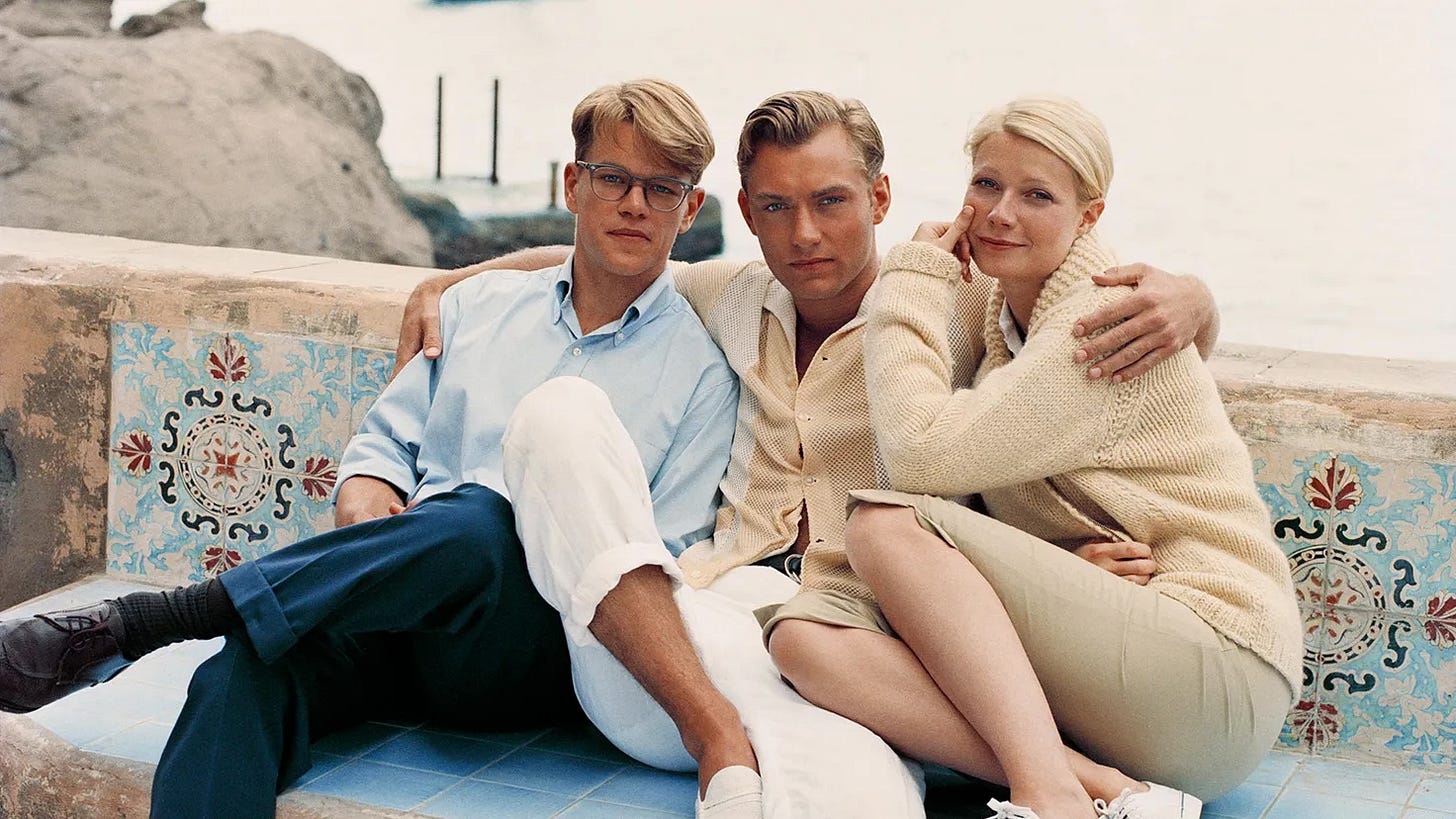Ripley, The Netflix series based on Patricia Highsmith’s first Ripley novel has had some very dusty reviews and some almost ecstatic ones. I wanted to write about which side I come down on - and why I think this is about more than just personal preference. A warning though: this piece is so stuffed full of spoilers that I wouldn’t read it until after you’ve watched the whole series. But after that, I would definitely read it. Maybe even twice.
First an amuse bouche of the reaction. In The Times (of London) the reviewer Carol Midgley wrote that “this adaptation is stunning. It is a work of art”. In the Financial Times Jo Ellison couldn’t have disagreed more. For her the series had “managed the unconscionable: to make Ripley deathly dull”.
When we (my wife Sarah and I) started watching Ripley – for entertainment and not with a critic’s eye and with the kids texting every half hour or so – I initially thought it was rather slow if intriguing and, as a lover of Italy in the summer, I missed the colour. We stuck with it though. And by the end of episode three realised it was something else entirely. From then on I ignored the family texts.
Essentially the main structure of this essay is to look at the main arguments of the anti-Ripleyites and dispatch them one by one to the critical Hades to which they belong. So I’d better start by acknowledging that these judgments are always subjective, and then quickly follow up by asserting that some subjective judgments are worse than others. How else to explain Marvel movies or Mrs Brown’s Boys?
The Not Minghella
The first and fairly consistent objection to Steven Zaillian’s eight-part series is that it is unlike the late and very much lamented Anthony Minghella’s 1999 film The Talented Mr Ripley. In the Wall Street Journal the columnist (and former Reagan speechwriter) Peggy Noonan recalled “the laid-back glamour of Jude Law, the Grace Kelly-ness of Gwyneth Paltrow, who looks like a Vogue magazine cover decided to take a stroll through the streets of 1950s Venice, the truly brilliant acting of Matt Damon…” With added brutal murders.
In the FT Jo Ellison went even further. She spoke for many of us when she described Minghella’s movie as a…
“sublime adaptation in which the quietly protean Matt Damon plays Ripley opposite Jude Law, as Dickie Greenleaf, the sunny Apollo who first captivates and then rejects the putrid-beach-short-wearing Tom. Minghella’s Ripley is achingly beautiful, emotionally bruising and entertaining. It’s one of my favourite films. It remains the template for ‘holiday boyfriend’ aspiration, and every frame looks like a Pinterest board.”
Well, maybe not the holiday boyfriend bit, but otherwise I agree with every word. Over at the New Yorker the culture editor Alex Barasch had watched the movie as a teenager and it had “left an indelible imprint” on his brain. Barasch’s younger self felt that “the charge between Jude Law’s Dickie Greenleaf, a wealthy layabout who’s decamped to Italy against his father’s wishes, and Matt Damon’s Tom Ripley… was unlike anything I’d yet seen on screen.”
But this new Ripley? Dour, empty of human life wrote Ellison.
“It is unrelievedly ugly” said Noonan, “Grimy, gloomy, grim. Tom Ripley is now charmless, a pale and watchful slug slithering through ancient rooms. He isn’t bright, eager, endearing, only predatory.” Just a reminder that Minghella’s eager, endearing Ripley murders three people, one more in fact than Zaillian’s predatory Ripley and – for that matter – Patricia Highsmith’s talented Ripley.
Let’s state the obvious here. The Ripley series is not a “remake” of Minghella’s film and it cannot be reasonably judged against it. Whatever you felt as a teenager about the movie or whether you just loved the glamour of Paltrow as Marge, as critic or just as an intelligent viewer you have to make the leap of seeing the series as a work in its own right. You can’t go to every performance of The Importance of Being Earnest and be continually disappointed because the Lady Bracknell doesn’t bring to “a handbag?” the same magnificent incredulity displayed by Dame Edith Evans. Though I have to admit that I usually do.





